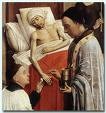 An older generation used to talk about “the Last Rites,” referring to the sacraments of Confession, Anointing, and the Eucharist received when someone was close to death. It may well be that Anointing is received at the same time as the other two sacraments, but it is a sacrament in its own right and not just for those at the very moment of death.
An older generation used to talk about “the Last Rites,” referring to the sacraments of Confession, Anointing, and the Eucharist received when someone was close to death. It may well be that Anointing is received at the same time as the other two sacraments, but it is a sacrament in its own right and not just for those at the very moment of death.
Given the sacrament is generally received privately, many people will not have witnessed it. The ceremony is simple. The priest lays his hands in prayer on the sick person’s head and then anoints their forehead and hands with holy oil. Christ instituted the sacrament to give the human soul the grace required at its hour of need. In His Providence, God may wish to heal the sick person in this life, or He may be preparing them for that journey into eternal life. In both circumstances, the priest and the family are often privileged to see the sacrament bring enormous peace and comfort to the sick person. It is something, therefore, that should be asked for by every Catholic at the appropriate moment.
When is “the appropriate moment”?
The sacrament of Anointing is not the equivalent of a couple of pills to be taken when we are feeling under the weather. It exists for those who are in some serious danger due to sickness or old age. We should not hesitate in asking if someone is in a serious condition or is facing the prospect of serious surgery. The priest will always be happy to answer your request.
Privacy regulations make it very difficult for priests to discover now when a Catholic is seriously ill in hospital. It is the responsibility of family and friends to notify the priest. If the circumstances permit, it might be possible for the Anointing to be celebrated before entry to hospital. In any event, we should not hold back from the spiritual help Christ gives us.
“Is any among you sick? Let him call for the priests of the Church, and let them pray over him, anointing him with oil in the name of the Lord; and the prayer of faith will save the sick man, and the Lord will raise him up; and if he has committed any sins, he will be forgiven,” (James 5:14-15)